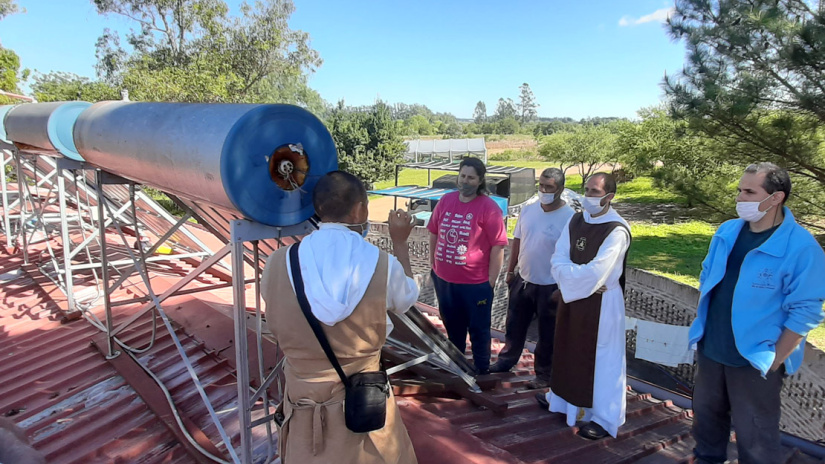First Course on Renewable Energy: Heating Water Through Solar Energy
First Course on Renewable Energy: Heating Water Through Solar Energy
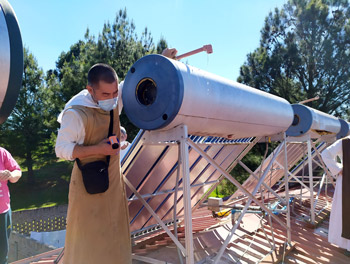 On October 12, the first theory-practice meeting on alternative energies took place for the members of the Light-Community Fraternity of Aurora. The first course presented the water-heating system that uses solar energy. The goal of this course is not only to provide information on the use of these renewable energies, but also to stimulate interest in these systems that are fed by natural and unlimited sources.
On October 12, the first theory-practice meeting on alternative energies took place for the members of the Light-Community Fraternity of Aurora. The first course presented the water-heating system that uses solar energy. The goal of this course is not only to provide information on the use of these renewable energies, but also to stimulate interest in these systems that are fed by natural and unlimited sources.
Nowadays, it is more and more present in the consciousness of humanity that conventional energy sources are not only finite, but that their process and use create polluting waste on the planet; all of this leads to the need to begin implementing clean and renewable energy systems. A renewable alternative energy is one that can be substituted for conventional energies or energy sources, with a lesser contaminating effect and basically with possibility for renewal.
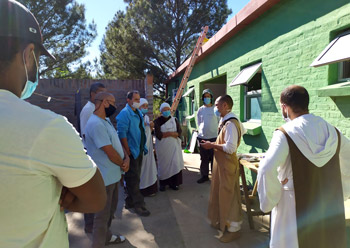 The Light-Community has various renewable energy systems installed, especially those fed by solar energy, and it was necessary to become aware of its use and maintenance. The most used system is the heating of water by sunlight, which was explored more deeply in this first stage on a theoretical and practical level. The theory part included basic concepts such as the meaning of energy and heat, the explanation of the laws that govern this system in particular, and its components. The practical part consisted in the observation of the mechanism and the calculations that establish its functioning, the identification of the components of the solar water heater and the testing of the temperature of the water.
The Light-Community has various renewable energy systems installed, especially those fed by solar energy, and it was necessary to become aware of its use and maintenance. The most used system is the heating of water by sunlight, which was explored more deeply in this first stage on a theoretical and practical level. The theory part included basic concepts such as the meaning of energy and heat, the explanation of the laws that govern this system in particular, and its components. The practical part consisted in the observation of the mechanism and the calculations that establish its functioning, the identification of the components of the solar water heater and the testing of the temperature of the water.
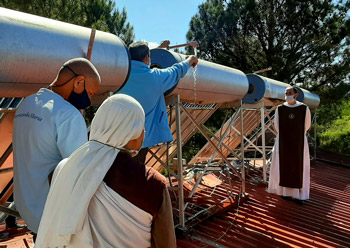 “The response of the people was very positive; they showed great interest and various questions arose that will be clarified in future meetings,” says Friar Cristóvão, one of the people responsible for the work and projects of the Light-Community and who managed the present course.
“The response of the people was very positive; they showed great interest and various questions arose that will be clarified in future meetings,” says Friar Cristóvão, one of the people responsible for the work and projects of the Light-Community and who managed the present course.
Part of the Community will participate in putting into practice what they learned, which will consist of various stages. As a first step, there will be a maintenance of the system through cleaning the water storage tanks, also called boilers, since these tend to accumulate calcium carbonate or scale, which gets in the way of its correct functioning. Then there will be an inspection of the installations of the three areas to create a plan to improve them and make them more efficient, and as a third step, there will be projects for the installation of more water-heating systems.
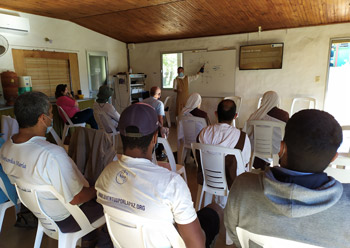 “The course helped us in understanding how to take care of the water, how to better distribute it, and how to maintain this renewable system,” explains Álvaro Nalerio Cruz, a member of the Light-Community that participated in this meeting. “The course taught us steps for better operation and proper care.”
“The course helped us in understanding how to take care of the water, how to better distribute it, and how to maintain this renewable system,” explains Álvaro Nalerio Cruz, a member of the Light-Community that participated in this meeting. “The course taught us steps for better operation and proper care.”
In the next courses, there will be a deeper study of these energies that don’t harm the environment and help to generate the condition of self-sustainability, a goal to be achieved in the Light-Communities.
